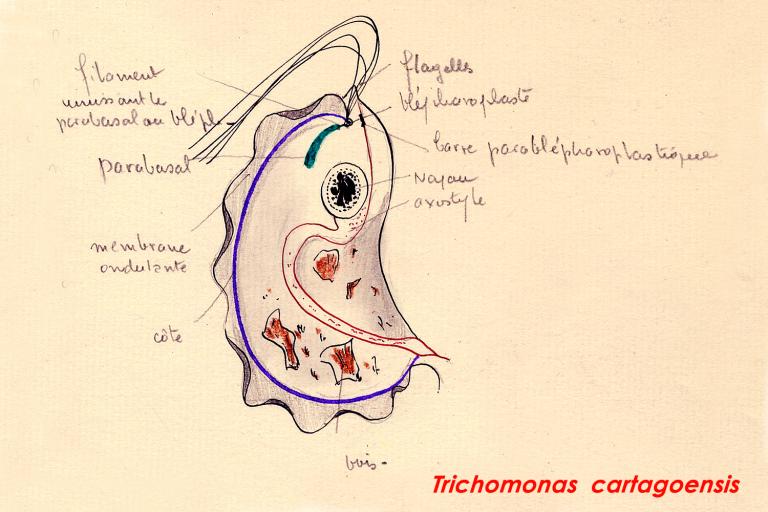The collection of Protists from the Museum is a scientific collection composed of two sub-collections:
- The historic collections of French Protistologists
- The living collections of parasitic or free protists, cryoconserved (-80°C and liquid nitrogen) or maintained in culture
| In charge of the collection | |
|---|---|
| GRELLIER Philippe |
Professor MNHN In charge of the historical collection of protists |
| DELLINGER Marc |
Lecturer MNHN In charge of the historical collection of ciliated protists In charge of the living collection of free living protists |
| DEPOIX Delphine |
Lecturer MNHN In charge of the living collection of parasitic protists |
Details can also be found on the MNHN site:
The historic collections by Franche protistologists such as E. Chatton, A. Hollande, G. Deroux, J. et M. Cachon, J.P. Mignot, M-O. Soyer-Gobillard and others are composed of microscopic preparations (more than 23000 slides), photographies, photonic and electronic microscopy negatives and original drawing, mainly ciliates, flagellates and apicomplexans. They contain numerous “type” slides (slides used to describe a new species).

Trypanosoma cruzi (Chagas, 1909) : attachment and invasion of a human cell by a trypomastigote © MNHN - Philippe Grellier
The living collections of parasitic or free protists, which are cryoconserved (-80°C and liquid nitrogen) or maintained in culture: Apicomplexa (Plasmodium ), flagellates (Kinetoplastida , Trichomonadida , Diplomonadida) and free living protists, mainly Ciliophora (Frontonia , Nassula , Paramecium, …), but also other groups (Amoeba proteus, Reticulomyxa filosa, and other foraminifera, …). This collection is the main source of our protist DNA collection. These collections are used for research (biology, evolutionary history) and teaching.
Activities
The collection is regularly enriched by the deposit of “types”, by donations of collections from Protistologists, by the isolation, by the culturing and cryoconservation whenever possible, by protists isolated from various environments (free protists from soil, freshwater, seawater or animal parasites).
The living collections provide reference or environmental stocks that will be of use in fundamental (model systems for biological questions) and applied research (pathogenic protists with a veterinary or an impact in human, for exemple Plasmodium, the agent of malaria and trypanosomes affecting humans (sleeping sickness and Chagas disease) or animals).
The DNA collections allow the elucidation of phylogenetic questions.
In addition to the interest of the slides “types” present in the historic collections, these collections, often associated to reference articles or drawings, allow to follow the evolution of techniques in protistology and to supply an iconographic support of quality for the constitution of databases on protists and the conception of educational tools. Several CD-ROM retracing the scientific careers of leading french protistologists such as Edouard Chatton and André Lwoff, or detailing the biology of specific families of protists have been or are currently being realised.

Trichomonas cartagoensis - Drawing by Pr A Hollande © MNHN André Hollande/Philippe Grellier

Collection of Protists © MNHN - Agnès Iatzoura
- Collection from J. L. Albaret : Heterotriche ciliates (slides)
- Collection from J. and M. Cachon : Marine protists (photographic documents)
- Collection from J.P. Changeux : Echinoderme Apicomplexa (lames)
- Collection from E. Chatton : Dinoflagellates, Apicomplexa, Ciliates …. (slides)
- Collection from G. Deroux : Marine protists (slides)
- Collection from E. Fauré-Fremiet : Ciliates (lames)
- Collection from A. Hollande : Ciliates, Flagellates (slides and original drawings)
- Collection from P. Jolivet, R. Ormières, J. Théodorides : Gregarina (slides)
- Collection from A. Schneider : Various protists (slides)
- Collection from M.O.Soyer-Gobillard : Dinoflagellates (slides and photographic documents)
- Collections of cryoconserved protozoa : Plasmodium, Trypanosoma, Leishmania, Giardia, Babesia, Trichomonas, …
- Picture library
- Atlas of Hemosporidia from Cambodge and Madagascar
- Edouard CHATTON (1883-1947): an important protistologist of the 20 th century
- André LWOFF (1902-1994): Nobel prize of medicine and Protistology
- Microscoporidia I: organisation and biology (by Dr G. Bioux and Dr F. Coste)
- Euglenozoa and Kinetoplastida (by Dr G. Brugerolle)

